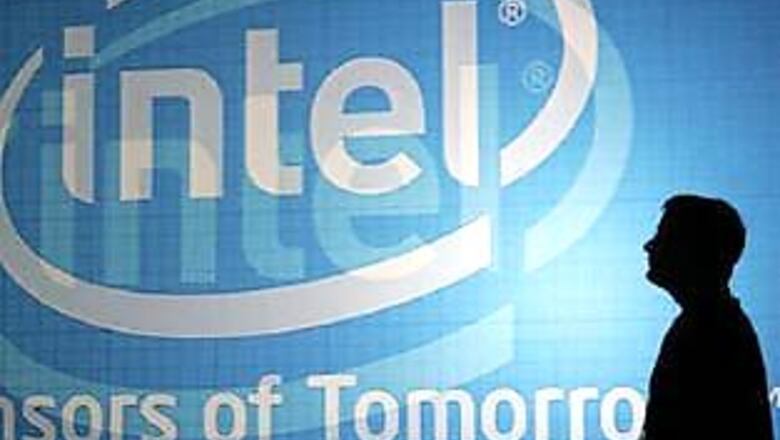
views
San Francisco: Intel Corp will pay rival chipmaker Advanced Micro Devices (AMD) Inc $1.25 billion to settle all outstanding legal disputes, in a move that can hasten the resolution of Intel's antitrust troubles.
AMD, whose shares jumped 22 per cent, agreed to withdraw essentially all its regulatory complaints and litigation against Intel, ending a global campaign that it has waged on the world's largest chipmaker for 12 years.
Some analysts said the deal takes the steam out of a pending US Federal Trade Commission (FTC) investigation into Intel's business practices.
But others said Intel has critics beyond AMD and its regulatory troubles are far from over. Among Intel's adversaries are graphics chip maker Nvidia Corp and New York Attorney General Andrew Cuomo.
Intel Chief Executive Paul Otellini denied any wrongdoing by the company but said it decided to settle the dispute with AMD to avoid the risk of a triple-damages finding by a jury.
"Intel got the fact that it was a major risk of a huge settlement in front of a jury," said Broadpoint Amtech Analyst Doug Freedman. "It removes the coin-flip of a jury trial."
AMD has argued that Intel used illegal means to preserve its 80 per cent share of the global market for central processing units, which are the brains of personal computers.
Regulators in Asia and Europe have agreed, imposing fines and other remedies on Intel. The US Federal Trade Commission is close to filing its own complaint, sources have said.
FTC Chairman Jon Leibowitz said the agency will review the settlement and could not comment further because of its ongoing investigation. Otellini said Intel will meet with the FTC to explain the settlement.
Experts have said it is in Intel's interest to resolve its antitrust troubles as quickly as possible so it does not wind up like Microsoft Corp, which has spent a decade fighting competition agencies around the world.
In court against Nvidia
If the FTC goes ahead with its complaint, Intel will have to address broader questions on its business practices that go beyond its dealings with AMD.
"If they (FTC) were going to file a lawsuit, they're going to file a lawsuit. It will have no impact," John Briggs, antitrust attorney with Axinn Veltrop Harkrider LLP said of the AMD settlement.
The AMD deal covers central processing units and has nothing to say about the fast-growing market for graphics processing units, which facilitate pictures and video on PCs.
Graphics chip maker Nvidia is already in Delaware court with a patent dispute with Intel, and said its ability to compete is being squelched by the larger company.
"We would be extremely disappointed with a decision to drop the FTC case. We don't think that protects consumers for current technology, as well as future technology," said Nvidia's general counsel, David Shannon.
PAGE_BREAK
New York Attorney General Andrew Cuomo has separately filed an 83-page lawsuit last week asserting that Intel threatened computer makers and paid billions of dollars in kickbacks to maintain its market dominance.
A source familiar with the matter said the AMD-Intel settlement does not change the attorney general's complaint.
"We strongly disagree with the New York Attorney General's case, and believe the complaint is entirely without merit. Discounting and rebates are standard business practices and perfectly legal," Otellini said.
Intel has hired WilmerHale partner and antitrust specialist Douglas Melamed to fill its vacant general counsel position, a source familiar with the company said.
Global settlement
AMD agreed to drop a lawsuit against Intel in Delaware and two cases in Japan, saying the settlement creates a level playing field and is "a pivot from war to peace." AMD noted though that some narrow issues on Intel rebates remain.
The two companies also sealed a five-year cross license deal and gave up any claims of breach from a previous licensing agreement, paving the way to make AMD fully "fabless."
AMD had spun off its chip fabrication factories into GlobalFoundries, but was forced to maintain a majority ownership because of existing licensing provisions.
An independent GlobalFoundries is expected to combine with Chartered Semiconductor Manufacturing Ltd in Singapore because both companies have heavy investment from Abu Dhabi's sovereign wealth fund.
"It will take time for people to understand how operating conditions in the processor business have changed. But make no mistake, they have changed," said AMD CEO Dirk Meyer.
Analysts expect AMD, which reported its 12th consecutive quarterly loss last month, to use the settlement to pay down some of its $3.2 billion of debt.
"It eliminates a large amount of uncertainty for both companies. $1.2 billion is a lot of money and I believe AMD will use it to accelerate their debt payment," said Joanne Feeney of FTC Equity Capital Markets.
Shares of AMD jumped $1.16 to $6.48, lifting its market value to about $4.3 billion from $3.6 billion.
Shares of Intel fell 16 cents to $19.68, in line with the broader decline on Nasdaq.
Intel chipmaker adjusted its fourth-quarter outlook due to the settlement, raising its spending forecast to $4.2 billion from $2.9 billion. It said its effective tax rate would be about 20 per cent, down from 26 per cent.



















Comments
0 comment